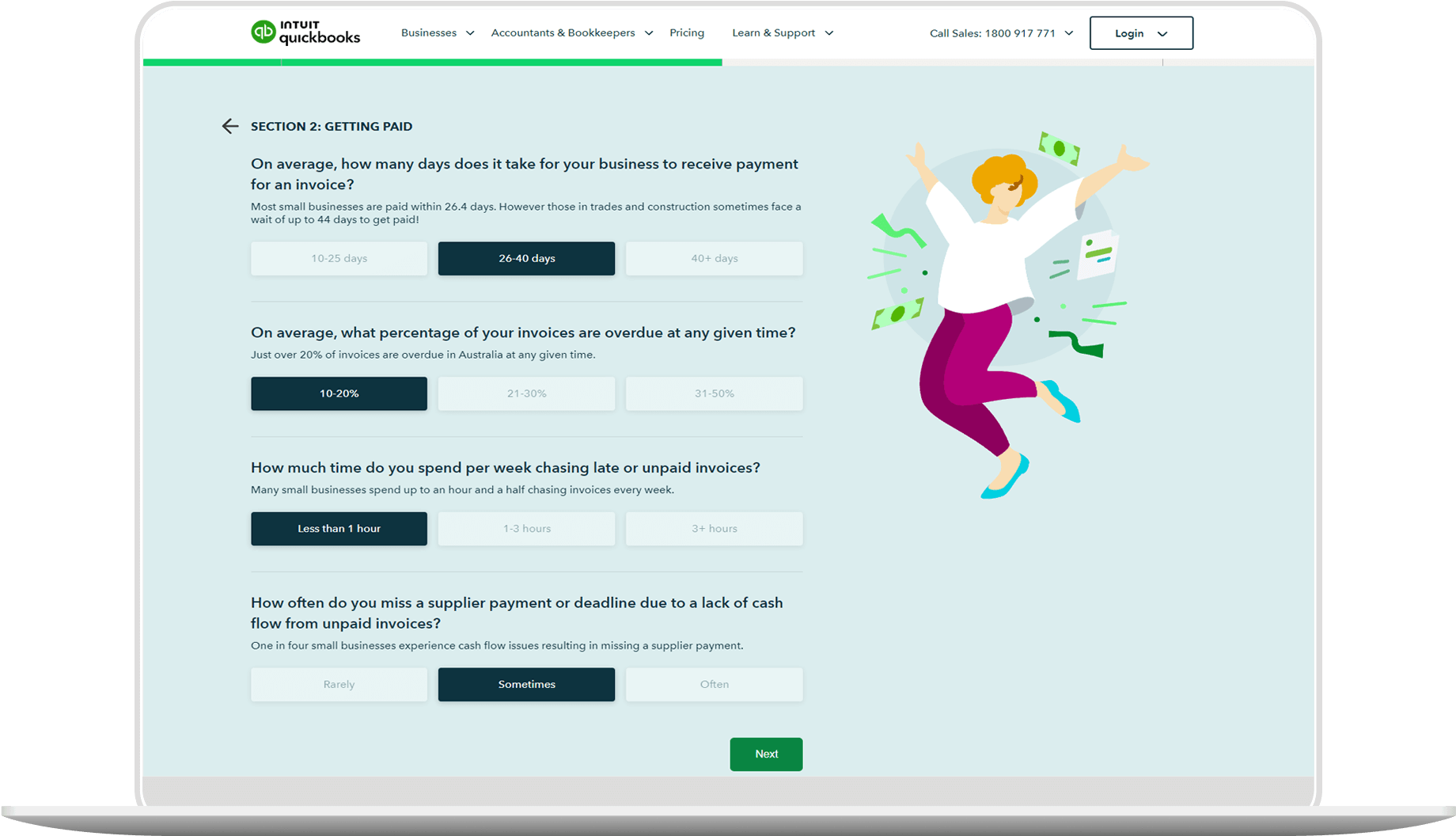In this article, you will learn about the following:

Budgeting software: Features, types, and benefits
- What is budgeting software?
- Budgeting software for business
- Personal budgeting software
- Home budgeting software
- Benefits of budgeting software
- Typical features of budgeting software
- Considerations when buying budgeting software
- Relevant budgeting software trends
- Using QuickBooks budgets and forecast reports
- Comparing budgets and forecasts
- Laying out your master budget
- Potential budgeting issues
Despite technological advancements, many companies, regardless of their size or industry, present budgeting and forecasting as one of the major challenges they face.
When it comes to creating a business or personal budget, we do not think about investing in budgeting software. Rather, we rely on creating budgets and spreadsheets manually.
This turns out to be quite burdensome and time-consuming. There are many leading companies that address budgeting and forecasting challenges by adopting new technologies and implementing best practices. This is because such initiatives help them develop accurate budgets, save time, promote collaboration and make decisions effectively.
Given the importance of budgeting, this article highlights how budgeting software can help with dynamic forecasting and describes the features of budgeting software and points to consider when purchasing budgeting software.
What is budgeting software?
Budgeting software refers to a computer program that helps you as a business and individual develop, maintain, track and change your budgets. This software has been in existence for a very long period of time – one of the first programs on personal computers was the spreadsheet, which helped businesses and individuals maintain their data in a simple and organised way.
Since budgeting software is a computer program, it maintains accuracy by reducing human error, which is a common thing to happen while preparing budgets manually.
In addition to this, automated reminders in budgeting software ensure that you avoid going over budget and alert you to any suspicious transactions. In general, there are 2 types of budgeting software. One is business budgeting software and the other is personal budgeting software. Business budgeting software is quite complex, relatively expensive and demanding.
Budgeting software for business
Small business budgeting software is an online budgeting tool that helps you manage your business budgets in an organised and streamlined way. Small business budgeting software is a bit more complex than personal budgeting software and comes with different features depending upon the business’ needs.
This software offers a host of forecasting methods in order to help you as a small business to plan your budget. In addition to this, you can even generate different types of reports that give you insights into your business finances, that is, your daily expenditures.
Small business budgeting software like QuickBooks offers the functionality to create budgets monthly, quarterly or yearly. It also provides the option to prefill the data automatically from the current or the previous year in the created budget.
In addition to this, you can even split the budget by class, customer or location and then specify what class, customer or location to add to the budget.
Besides creating budgets, you can also view the following reports:
- A budget overview, which is a summary of budgeted amounts for a specific budget.
- The budget vs actuals is a report that provides a summary of budgeted amounts against the actual amounts and their variances and variance percentages.
Personal budgeting software
Personal budgeting software is similar to business budgeting software. However, it is less complex and much easier to use. Some personal budgeting software offers the functionality to manage budgets and track expenses, while other budgeting software helps users manage investment portfolios.
These types of budgeting software bring together your balances and bills all in one place so that it’s easy for you to understand and manage your finances.
You simply need to connect your bank accounts with the budgeting software to get a snapshot of your finances in minutes.
Furthermore, personal budgeting software automatically updates and categorises your information as it gets integrated with your bank accounts, credit cards and retirement accounts.
In addition to this, you can also set goals while creating budgets. Say, for instance, you want to purchase a digital camera from your savings this year. So, you simply need to enter the amount of money that you will need to purchase the camera into the budgeting software.
Then, the software will go through your previous year’s data and set an amount that you need to set aside in savings in order to meet your goal.
It is important to note here that some budgeting software provides you with suggestions as to what expenses you need to cut down in order to meet your goal.
Home budgeting software
Home budgeting software is software that you can use to keep track of your income and expenses by updating details pertaining to your finances in your software.
The kind of home budgeting software that you need depends on the goal that you want to accomplish. That is, if you want to track your spending over a period of time, then a simple spreadsheet with a budget template will make the task of budgeting easier.
However, if you need to create multiple categories along with their spending limits, then you will require more advanced home budgeting software. In this case, you can either use computer-based budgeting software or web-based budgeting software.
Computer-based budgeting software stores the information on your own computer and not the server. Moreover, it’s a one-time investment, as opposed to web-based budgeting software, which will require a monthly or annual subscription.
Free web-based budgeting software, on the other hand, is accessed via a browser and stores information in the cloud. Besides this, this kind of software offers advanced security and can be accessed at any time, anywhere and through any device.
Benefits of budgeting software
The following are the advantages of using budgeting software:
- Makes budgeting simple
One of the major features of budgeting software is that it automatically updates various categories of accounts, including income, cost of goods sold and expenses. This saves you a lot of time as you do not have to manually update each and every transaction or prepare a budget for the following year.
- Ensures reliability
Since various categories of accounts get updated automatically, there are fewer chances of committing errors. Such accurate data makes your budgets and forecasts more reliable and thus helps in better decision making. This is because it gives a realistic view of your business in the long run.
- Saves costs
Cloud-based budgeting software helps you save on costs, as you only need to pay monthly or yearly subscription fees, unlike traditional budgeting software, which requires a one-off investment. Besides providing core functionality, cloud-based budgeting software provides third-party integrations for functions that are not at the core of your business, e.g. payroll.
- Gives you control
Preparing budgets in spreadsheets increases the chances of your data being exposed to data alteration, both by mistake or malicious intent. Such changes to your data could result in massive errors while reporting and lead to poorly informed decisions. Cloud-based budgeting software gives you full control over the data, as the information gets saved in the cloud and is accessible only to those individuals who have been given the permissions to work on the data.
- Gives you a snapshot of day-to-day operations
Since your bank accounts are integrated with the budgeting software, your income and expense postings and your expenditures on day-to-day operations get updated automatically. Thus, by obtaining an up-to-date snapshot of your businesses’ everyday operations, you have great control over business planning and strategy.
- Enables data entry and collaboration
A cloud-based bookkeeping, accounting and budgeting software allows you to import existing Excel budgeting spreadsheets into one intuitive system.You can also create your own budgets based on the previous year’s updated data in the budgeting software. Thus, there is no need for manual data entry and you can effectively track and control data inputs. In addition, budgeting software also allows collaboration so that various members of the team can do analyses easily.
- Data security
Since cloud-based budgeting software offers the functionality of user permissions to access the data, this ensures that the security of your data is managed tightly. Apart from this, the budgeting software follows data security standards implemented by the top financial institutions and banks. So, this gives you the control and reassurance in terms of data security that you expect out of your budgeting software. In addition to this, budgeting software also gives control over audits as you get a complete audit trail for all the changes made to data whenever you need it.
Typical features of budgeting software
A good budgeting software has the following set of features:
- Data import
Cloud-based budgeting software allows you to integrate your bank accounts, investment accounts, retirement accounts, etc. This enables you to import data seamlessly as the data gets updated automatically when transactions occur.
- Custom reports
Online business budgeting software like QuickBooks helps you to create a customised budget and budget vs actual reports. These reports give you an overview of the actual and budgeted amounts in various categories of accounts. Such a comparison helps you to understand whether you are on-budget or over-budget.
- Expense tracking
With cloud-based budgeting software, you can keep track of expenses in real time and get customised reports that give a breakdown of all the details. This is possible via the integration of bank accounts with software.
Thus, your business gets an overall snapshot all in one place and also helps you spot any unauthorised activities without having to wait for the monthly statement to get completed.
- Budget plans
Budgeting software is used by business people and individuals primarily to create and maintain business and personal budgets. Besides giving an overview of your business finances all in one place, budgeting software also generates a budget automatically based on your businesses’ income and expenses, investments, and contributions to retirement accounts. Thus, such an overview helps you as a business to manage your finances effectively.
- Access at any time, anywhere
Cloud-based budgeting software offers you the flexibility to access your financial data at any time, anywhere and through any device. This is because everything saves in the cloud and you just need an internet connection to access the data either via an online browser or through an application.
- Simple and easy to use
Good budgeting software has a user-friendly interface and is quite simple to understand. Thus, various functionalities like exporting data, categorising charts of accounts and integrating bank accounts with the software are a breeze with good budgeting software.
- Alerts
With the arrival of cloud-based budgeting software, gone are the days when you had to manually check whether you were overspending or not making payments on time. Budgeting software sends alerts in order to ensure that you are not overspending or missing any payments. This means that whenever you surpass any set goals or benchmarks, your cloud-based budgeting software will notify you.
Considerations when buying a budgeting software
A great budgeting software should offer functionalities that help to reduce errors and save time during the entire budgeting process. Therefore, before investing in a business budgeting software, the following are the factors you need to keep in mind:
- Mobility
One of the major considerations while selecting budgeting software is that it should offer the functionality to access financial data at any time, anywhere and through any device. Such a solution should not tie you to your desk and should provide secure access to your financial data on the go.
- Seamless collaboration
A good business budgeting software never restricts access to financial data just to a single user. It allows multiple users to work on their budget in order to perform financial analyses and avoid any duplicate procedures.
- Integration with multiple data sources
Financial data is the very foundation of creating a budget. The major challenge with budgeting software is its lack of ability to obtain data from a variety of data sources. Therefore, you need to ensure that any budgeting software that you intend to purchase integrates with various types of data sources.
- Ease of Use
It is important to note that budgeting software must have a user-friendly interface. It should be intuitive and must have proper resources like customer support and a help desk so that the user can get help with problems.
- Importing/exporting data
A good business budgeting software must offer the functionality of importing data externally or through external systems. Furthermore, it should have the functionality of exporting data from budgeting software to Excel sheets for the seamless functioning of the business.
- Customisability
A good budgeting software should also offer the functionality to customise how to display the chart of accounts, the number format, the reporting period, the header and footer, negative numbers, rows and columns, etc.
Relevant budgeting software trends
- Cloud-based budgeting software is preferred by businesses. Software as a service (SaaS) offers flexibility and a modest cost that attracts businesses and individuals looking for cloud-based budgeting solutions. Besides this, cloud-based budgeting software offers access to real-time data, makes collaboration easy and offers immense data storage.
- With advancements in predictive analytics, it’s possible that budgeting software solutions may come to incorporate artificial intelligence, machine learning, data mining and simulation. This would help with generating predictive analytics and with giving your business stakeholders actual foresight.
- There is a shift from using spreadsheets for budgeting and forecasting to budgeting software solutions. Budgeting software offers collaborative solutions that not only generate accurate budgets and forecasts but also generate reports that help you as a business owner to make better decisions.
- Since the gig economy has set in, there is a great need for collaboration when teams work remotely. Thus, modern-day budgeting software offers the feature of team collaboration to make it easier for the team to work on a given budget spreadsheet.
- Cloud-based budgeting software also has the capability to generate customised financial reports. Such real-time reports help finance managers to make decisions effectively, as they are accurate and can be generated in no time.
- Modern-day budgeting software is not restricted to offering the sole functionality of budgeting and forecasting. Since businesses demand a unified platform that has the capacity to manage financial reporting, budgeting and consolidation, modern-day budgeting software offers a host of functionalities, as such an approach is cost-efficient and minimises disruption in business.
Using QuickBooks budgets and forecast reports
QuickBooks budgets and forecast reports help you to understand your business performance and compare your business’ actual revenue and expenses to the budgeted amounts.
Furthermore, these reports also help you to check if there are any cost-saving opportunities, errors or opportunities for business expansion. For instance, the Budget Overview Report in QuickBooks gives a summary of your business’ budgeted revenues and expenses monthly or quarterly.
On the other hand, the budget vs actual report compares your business’ actual revenues and expenses to the budgeted amounts in order to determine the variance. Such a variance helps you to understand whether you are over or under budget.
Budgets vs forecasts
Budgets and forecasts are both financial planning tools that help you to analyse various aspects of your business, strategise, plan and make decisions.
A budget is a financial tool that helps you estimate the revenues and expenses of your business for a specific period in the future. It allows you to control your day-to-day operations, business activity and spending.
A forecast, on the other hand, is also a financial tool that helps in estimating revenues and expenses based on the market and your current budgets. Industry trends and market outlooks influence forecasting to a greater extent.
Furthermore, forecasting is also dependent upon your business’ anticipated growth and customer spending factors, as well as external factors like the political and social environment, over which you have no control. Historical trends and industry data also influence forecasting to a greater extent.
Once you develop forecasts, you can analyse them in order to make adjustments.
Comparing budgets and forecasts
Both budgets and forecasts are financial tools. However, both differ in the sense of estimation. Where the budget is dependent on previous years’ financial data, forecasts also incorporate historical figures. However, they use this data to form expectations with regard to the future performance of your business.
Forecasts help you to adapt to new market conditions and variables. Thus, the forecast is always forward-looking.
Budgets are static in nature. However, they may be updated once a year depending upon the decision of the management of a business entity, while forecasts are updated at regular intervals. In addition to this, budgets include a comparison of actual amounts with the budgeted amounts to determine variances from the expected performance, while forecasts do not include any variance analysis.
Thus, we can say that the major difference between a budget and a forecast is that a budget is a plan that gives direction to your business, while the forecast indicates where your business is actually going.
Laying out your master budget
A master budget refers to a comprehensive single financial plan that combines a host of smaller budgets for your financial year.
The master budget of your business comprises operating budgets detailing revenues and expenses and financial budgets that show the expected inflow and outflow of cash. Once you prepare a master budget, you also prepare a budgeted balance sheet and income statement dividing the amount of income and assets your business should possess relative to the debts and expenses in the upcoming financial year.
So, while preparing a master budget for your business, you need to make sure that your small business is able to survive and grow throughout the upcoming year.
Therefore, your operating budget consists of the income statement of your business showing areas that generate income for your business and includes both revenues and expenses. The financial budget, on the other hand, comprises a cash budget and a budget for assets. Therefore, you need to first develop an operating budget and then use this data along with assumptions you need to prepare a financial budget.
Your operating budget includes the budgeted amounts of the following components:
- Forecasted sales
- Inventory
- Direct material
- Direct labour
- Overhead costs including fixed and variable costs
- Ending finished goods inventory
- Selling and administrative expenses
The financial budget, on the other hand, includes:
- Cash budget
- Budgeted balance sheet
- Capital expenditures budget
Potential budgeting issues
There are a lot of problems attached to creating budgets for your business:
- Since budgets are created on the basis of certain assumptions, there is a higher chance of a budget being inaccurate, especially when the business environment changes drastically.
- Creating budgets is a time-consuming process. However, cloud-based budgeting software reduces the time required to create budgets.
- Since budgets are numeric in nature, they focus only on the quantitative aspects of your business, such as profitability. They don’t take into consideration the qualitative aspects, such as customer needs.
- A small adjustment to a budget may lead to complex back and forth redoing of numbers and, hence, falling short of deadlines.
Frequently asked questions
Related Articles
Looking for something else?

TAKE A NO-COMMITMENT TEST DRIVE
Your free 30-day trial awaits
Our customers save an average of 9 hours per week with QuickBooks invoicing*
By entering your email, you are agree to our Terms and acknowledge our Privacy Statement.


















